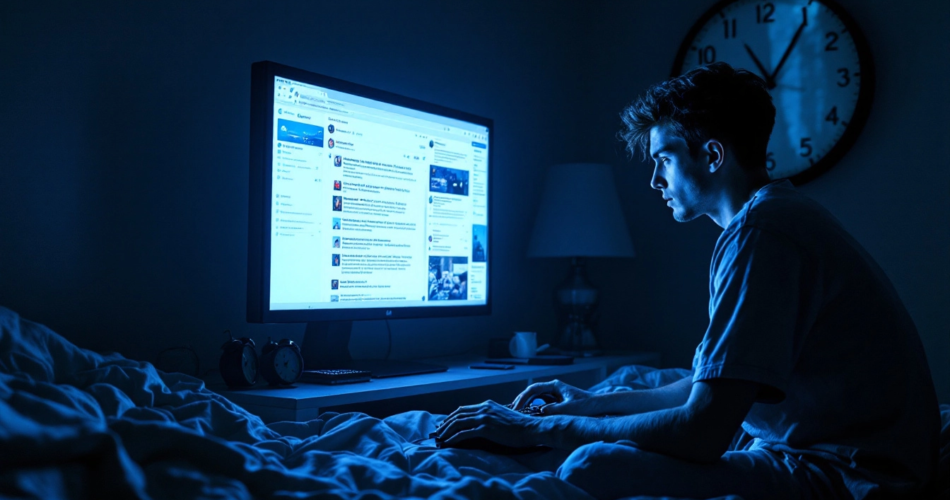Did you know that over 80% of people check their phones right before bed, often spiraling into what is known as doomscrolling? This growing habit, combined with sleep disturbance, is taking a significant toll on our mental and physical health, especially our brain. Doomscrolling, the act of endlessly consuming negative news online, paired with poor sleep, creates a ripple effect that impacts memory, cognition, and emotional well-being. In this article, we’ll dive deep into how doomscrolling and sleep disturbance are interconnected and why breaking this cycle is essential for your brain health and overall well-being.
Table of Contents
- What is Doomscrolling and How Does It Relate to Sleep Disturbance?
- The Science Behind Sleep Disturbance and Brain Health
- How Doomscrolling Disrupts Your Sleep Cycle
- Cognitive and Emotional Consequences of Poor Sleep
- Strategies to Break the Cycle of Doomscrolling and Sleep Issues
- FAQs
- Conclusion
What is Doomscrolling and How Does It Relate to Sleep Disturbance?
Definition of doomscrolling and its prevalence in the digital age
Doomscrolling refers to the compulsive activity of scrolling through negative news or content on digital platforms, often in search of updates on troubling events. Social media, news apps, and even search engines have amplified the prevalence of this behavior, making it easier than ever to fall into the trap of negativity. According to research, doomscrolling spikes particularly during times of global or personal crises, such as a pandemic or political upheaval.
Relationship between nighttime doomscrolling and sleep issues
Nighttime doomscrolling often involves staring at screens, which emit blue light, a known disruptor of the body’s circadian rhythm. This leads to difficulty falling asleep. Additionally, the act of consuming alarming or upsetting news fires up the brain’s stress response, resulting in mental restlessness and poor sleep quality. Studies on social media and sleep disturbance highlight the strong association between screen exposure, anxiety, and irregular sleeping patterns.
The Science Behind Sleep Disturbance and Brain Health
How sleep affects brain functions like memory and cognition
Sleep is essential for critical brain functions, such as memory consolidation, emotional regulation, and decision-making. During REM sleep, for example, the brain processes and stores information gathered throughout the day. A lack of sufficient sleep disrupts this process, leading to difficulty concentrating and retaining information.
Chronic sleep issues and long-term brain damage
Chronic sleep deprivation can result in more than just short-term memory loss or brain fog. It has been linked to higher risks of conditions like Alzheimer’s, depression, and inflammation of the brain. Poor sleep also reduces brain plasticity, hindering its ability to adapt and function efficiently. For more details, a study on sleep and brain health sheds light on the importance of quality sleep in slowing cognitive decline.
How Doomscrolling Disrupts Your Sleep Cycle
Emotional impact of negative news before bedtime
Doomscrolling increases stress levels by triggering the release of cortisol, a stress hormone that interferes with relaxation and sleep onset. Negative news before bedtime amplifies anxiety, leaving individuals tossing and turning instead of shutting off their minds for restful sleep.
Practical reasons doomscrolling extends wakefulness
Doomscrolling encourages habits like “just one more scroll,” leading to prolonged screen time and delayed bedtimes. This not only reduces the number of hours you sleep but also throws off your body’s natural processes for winding down. Creating boundaries around screen usage is a must.
Cognitive and Emotional Consequences of Poor Sleep
Increased risk of mental health issues
Lack of sleep resulting from behaviors like doomscrolling has been closely tied to mental health issues, including anxiety and depression. Chronic fatigue reduces the brain’s ability to regulate emotions, leading to a more fragile mental state.
Worsened decision-making and focus abilities
Poor sleep directly affects concentration and cognitive performance, which can harm productivity and decision-making in daily life. Sleep cycles disrupted by doomscrolling only make matters worse, creating a cycle of exhaustion and poor focus.
Strategies to Break the Cycle of Doomscrolling and Sleep Issues
Tips to reduce doomscrolling behavior
- Set app timers or restrictions on news-related platforms before bedtime.
- Replace doomscrolling with calming alternatives like reading or journaling.
- Create a relaxing evening wind-down routine that avoids screen time.
Establishing a healthy sleep routine
Develop good sleep hygiene by creating a device-free zone in your bedroom. Incorporate mindfulness exercises or gentle yoga to help you de-stress before sleeping. A curated bedtime routine can significantly improve sleep quality and break the doomscrolling cycle.
Frequently Asked Questions
What is doomscrolling, and why is it harmful to your sleep?
Doomscrolling involves endless browsing of negative news, often before bedtime. It increases stress and restlessness, disrupting your ability to fall asleep.
Can sleep disturbance caused by doomscrolling have long-term effects on the brain?
Yes, sleep issues from doomscrolling can lead to cognitive decline, memory loss, and even long-term risks like Alzheimer’s and brain inflammation.
What are some practical tips to stop doomscrolling at night?
Some effective tips include setting app limits, establishing screen-free zones, and replacing late-night scrolling with relaxing activities like reading or meditation.
How does blue light from screens affect sleep?
Blue light suppresses melatonin production, making it harder for your body to naturally wind down and prepare for sleep.
Are there apps that can help manage doomscrolling habits?
Yes, many apps like Freedom and Forest help limit screen time, encouraging healthier digital habits.
Conclusion
Breaking free from the vicious cycle of doomscrolling and sleep disturbance is crucial for your brain health and overall well-being. By understanding the negative impacts of these habits and implementing the strategies shared above, you can prioritize restful sleep, preserve cognitive function, and improve your day-to-day mood and productivity. Start small by setting clear boundaries with technology, and you’ll soon notice remarkable changes in your mental clarity and emotional resilience. Let today be the day you take control and commit to healthier digital habits!


